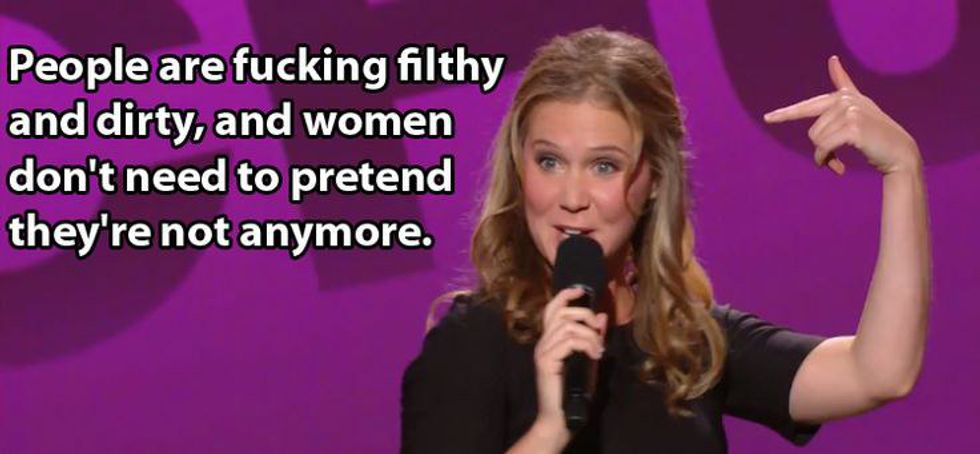If you don’t know the name of this stand-up comedian, writer, actress and producer, it’s only a matter of time. And if you don’t have a strong opinion about her persona and her comedy, that is only a matter of time, too.
New to the celebrity spotlight, Amy Schumer is a rising female icon and rising hot topic. With her boisterous wit and shameless candid attitude on topics ranging from sex to periods, to body image and dieting, she’s breaking conventions through her assertion of a new, modern female persona. Raunchy, bold and unapologetic, she's speaking frankly about her sexuality, using “her platform to skewer social her platform to skewer social issues like beauty standards, fatphobia, and even rape culture.” Amy Schumer’s full embrace of all the bullsh*t that comes with the female experience is one of celebration, and it is for this she is hailed a modern feminist role model.
But not everyone sees it this way. There is something about Amy Schumer that has people divided. Not everyone enjoys her curse-ridden one-liners, her detailed sexcapades gone wrong and the unapologetic way in which she divulges the dirt.
“She’s gross.”
“She’s obnoxious.”
“I don’t know what it is, but she bothers me.”
OK...so, why? Sex and racy topics are nothing that hasn't been covered by stand-up comedians before. In fact, nearly all stand up is completely centered around punchy, smutty one-liners and absurd personal stories that divulge cringe-worthy details, who’s unspeakable nature is at the core of why we laugh.
So what it is then? How is it that Amy Schumer’s persona is celebrated by some, yet unsavory to others?
The answer lies within a comedy theory perspective. Johnny Carson of The Tonight Show once shared his view of female comedians: “A woman is feminine, a woman is not abrasive, a woman is not a hustler… if a woman comes out and starts firing one-liners, those little abrasive things… are a little aggressive for my taste. I’ll take it from a guy, but from a woman, sometimes, it just doesn’t fit too well” (Stott 85). In "Theory of Comedy," author Stott notes, “Comedy concerns the voicing of the unsayable, it is interesting to consider how much revolves around the question of when, where, and how women are allowed to speak."
Breaking the expectations of how a woman should be on stage, is just what Schumer is doing, and this explains the discomfort many say she evokes in them. Schumer presents a robust female persona, one Joan Rivers has paved the way for. As Rivers explains, “the notion of a female performer who was witty, outspoken, and claimed all the privileges of free and profane speech was seen as a direct challenge to the prevailing views of how a woman should comport herself.”
There is something, perhaps, “unladylike” in Schumer's comedy. Her comedy utilizes The Grotesque and The Release Theory, a combination not traditionally embodied by a woman. It is for this reason that people love her, and for this same reason that people have a distaste for her. The Grotesque is the theory that humor is derived from topics involving “anal, oral, and phallic monstrosities whose sexual and catalogical openness hopes to release the world from pathological inhibitions and the stress of maintaining manners,” which results in laughter and “an ambiguous feeling pitched somewhere between pleasure and disgust” (Stott 67). To hear a woman speak this frankly and unashamedly on stigmatized female topics is funny in its incongruity with what you would expect. For women, her stories are so relatable, and to share them is something they could never imagine themselves so publicly admitting. This is where The Release Theory fits in, it’s a moment of breaking and relaxing social norms that relieve the pent up anxiety of acting appropriately. As Amy puts it, “My comedy is unapologetic and fearless. Like, sometimes you’ll wind up having condomless sex with someone that you probably shouldn’t. I’m interested in sharing that part of myself unapologetically so that other people will hopefully feel better”.
Schumer celebrates the entirety of “girl-culture” in a very public and graphic way, and I think this is powerful. The female experience is a complicated, stressful, confusing and sometimes shameful one. Schumer tells it like it really is, and a distaste for her is a distaste for the reality of womanhood. It’s proof of an underlying misogyny still very much woven throughout our culture. You don’t have to enjoy grotesque humor or stand-up comedy, but if you don’t like the way Amy Schumer is doing it, I implore you to ask yourself why.
I say it is time for women to speak confidently about themselves, to break down those stigmatized topics, the one’s that define our reality, and change the immediate reactions and mass public consciousness on what we can share about ourselves.
Comedy loves talking about the penis. But it's time to share the spotlight. The vagina is here, confident and unashamed, and she ain't going nowhere, whether you like it or not.






















